This is the second in a two-part series discussing the 2017 Kenyan elections. See here for more information on the unique facets of Kenya’s democracy and the 2017 election in particular. For recent news around the elections, see this week’s Africa in the news.
Only the Jubilee Party of Kenya and the National Super Alliance have shared manifestos on their aspirations for the populace. With the manifestos generally aligned to the aspirations in Kenya Vision 2030, the issues brought forth are similar, with differences in their approaches. It is important to note that the Kenya Vision 2030 aims to make Kenya an upper-middle-income country, emphasizing economic, social, and political transformation.
Economic issues have dominated the political campaigns. The incumbent Kenyatta government has focused on demonstrating the achievements made since assuming office in April 2013, including the establishment of county governments in the devolved system, completion of phase one of Standard Gauge Railway, successful piloting of the digital literacy program (which provides laptops to primary school going children), the establishment of Huduma Centers (one-stop government services points) across the country, increased electricity connectivity in rural communities, and removal of user fees from public health facilities. The government also is pointing to various challenges such as the drought spell that has seen shortage in supply of key staple food.
The main opposition coalition (National Super Alliance) is focused on the high food prices experienced under current drought conditions, which is adversely affecting the welfare of the poor and vulnerable groups. The government has intervened through subsidized maize flour to ensure there is adequate supply of grain and flour in the market. However, with the inadequate rains received during the long-rain season, the drought effects may be prolonged given that Kenya depends on rain-fed agriculture and hydroelectricity. The alliance emphasizes farmer support and agricultural markets. In its manifesto, the National Super Alliance also focuses on nation-building, institution-strengthening, health care, and an alternative to “trickle-down economics” of the Jubilee Party.
Labor unrest
Industrial and labor unrest, especially in the social sector, continue to characterize Kenyan elections. This time, however, the health sector has been hard hit by the doctors’ and nurses’ strikes. While the teachers unions, university academic staff union, and doctors were able to negotiate their collective bargaining agreements and settle with the government on the modalities of their salary adjustments, the negotiations with the nurses is still on the table—impacting the delivery of health services in public health institutions. Health is a devolved function and the role of county governments in addressing the industrial unrests cannot be ignored.
Skills, education, and unemployment
Currently, primary school education is free in all public schools, having been implemented in the first year of the National Rainbow Coalition government in 2003. Now, free secondary education to all learners in public schools is common in the manifestos, but the modalities of implementing are different.
Unemployment also features at the top of the parties’ manifestos, with a focus on providing a suitable environment for job creation to open up opportunities for the youth to engage in gainful economic activity. Both manifestos emphasis the need for transformation of industrial sector as key in generating high productivity jobs.
Security
Other issues include security, with a focus on the terrorism threat that remains a serious concern. Kenya’s proximity to the Somali border has seen the country have its fair share of terrorist attack including the Garissa University college attack in April 2015, the Westgate Mall attack in September 2013, and the 1998 al-Qaeda bombing of the United States of America Embassy in Nairobi. Terrorist incidences have caused the government impose some curfews, for example in Lamu, to secure the area. In addition, resource-based conflicts have escalated with the drought spell especially between pastoralists in their search for grazing and farmers who are land owners.
Corruption
Furthermore, corruption is a key area of interest for all political parties. The Ethics and Anti-Corruption Commission (EACC) has the mandate to combat and prevent corruption and economic crime in Kenya. While corruption cases being handled by EACC have increased, enhanced institutional networking with other relevant government agencies is required to support in investigation and prosecution of those suspected to engage in corruption.
In the next five years….
The political leaders elected on August 8 will have five years to push forward the Kenya development agenda. The aspiration of Kenyans to improve welfare with adequate, affordable and accessible basic commodities and services, need to be clearly articulated. This demands the elected leaders to offer exemplary transformative leadership.
REFERENCES
Government of Kenya (2010), The Constitution of Kenya. Nairobi: Government Printer.
Kenya National Bureau of Statistics (2017), Kenya Economic Survey 2017. Nairobi: Government Printer
Barkan, Joel D. (2001), “Elections in Developing Countries,” in Richard Rose ed., International Encyclopedia of Elections , Washington D.C.: CQ Press.
Lust-Okar, Ellen (2004), “The Management and Manipulation of Political Opposition,” Comparative Politics, 36 (2), pp. 159-179.
Diamond, Larry (1999), Developing Democracy: Toward Consolidation, Baltimore: Johns Hopkins University Press.
Transition to Devolved Government Act, 2012. National Council for Law Reporting. The Attorney General.
Nyanjom, O (2011), “Devolution in Kenya’s new Constitution.” Constitution Working Paper Series No 4. Society for International Development, SID.
https://www.iebc.or.ke/resources/?List_of_Candidates_for_2017_General_Elections. Accessed on 1st August 2017.
The Brookings Institution is committed to quality, independence, and impact.
We are supported by a diverse array of funders. In line with our values and policies, each Brookings publication represents the sole views of its author(s).

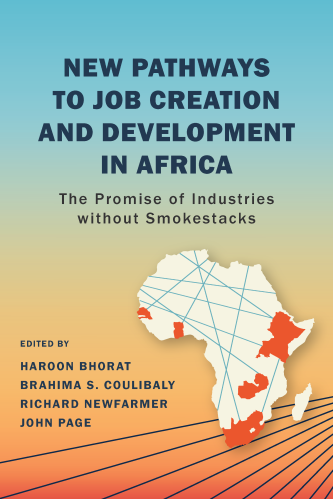
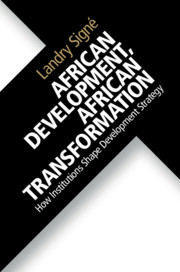
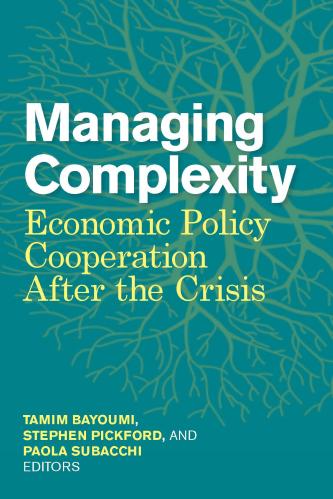
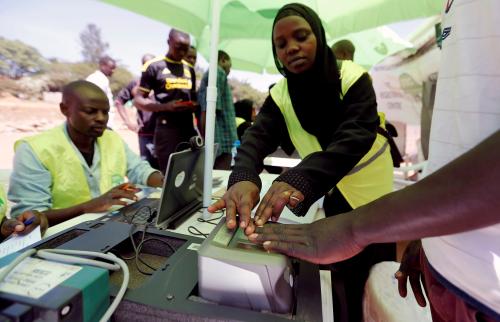
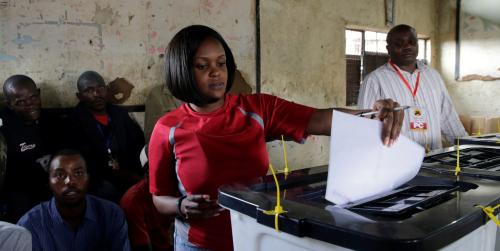




Commentary
Kenya’s election 2017: Same concerns, different approaches
August 4, 2017